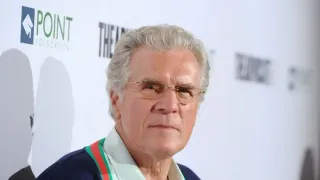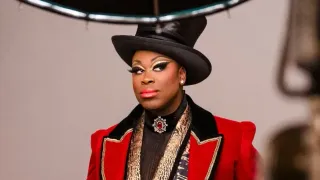
Dec 22
Grupo Frontera Heads to the Grammys With 2 Nominations
Berenice Bautista READ TIME: 3 MIN.
Regional Mexican band Grupo Frontera is heading to the 2026 Grammys with two nominations, following a double-nod at the Latin Grammys, where they competed for best regional Mexican song and a collaboration with Fuerza Regida.
While they didn't win a Latin Grammy, the band said they were honored to have shared the category with Los Tigres del Norte, a group they consider true legends. Now, Grupo Frontera looks ahead to the Grammys on Feb. 1, where they will compete for best Música Mexicana album (including Tejano) for their EP with Fuerza Regida, “Mala mía,” and their solo EP “Y lo que viene."
These are the group’s first Grammy nominations —a remarkable feat considering they only debuted in 2022.
“It’s something you would never think, that someone who plays our style of music would be nominated,” said the group’s vocalist and bajo quinto performer Adelaido “Payo” Solis III about the Grammys.
The idea for an EP with Fuerza Regida came from guitarist Beto Acosta, who drew inspiration from the success of their hit “Bebé dame” and other important collaborations such as “Oasis” by Bad Bunny and J Balvin.
“Our vibes are similar,” Payo said. “I feel that the chemistry is very cool."
The EP was recorded in Los Angeles, where the band took the opportunity to record additional material, including “Tu favorita”, a collaboration with Fuerza Regida and Chilean artist Cris MJ, featured on their latest album “Lo que me falta por llorar."
“The cool thing is that they are from Los Angeles and we are from Texas,” Payo said of the band led by Jesús Ortiz Paz. “We kind of have a certain style that we grew up listening to … I feel that that was a super perfect fusion."
Since the debut of “Lo que me falta por llorar," Grupo Frontera has maintained their momentum with a string of surprises and releases. Most recently, they joined Bad Bunny at one of his eight concerts in Mexico City to perform their hit “Un x100to.” They also released “Beses así” with Calle 24, and the music video for “Se me sale," one of the songs on their album.
Next up for the band is a long-awaited international tour that will take them to Latin America and Europe, including stops in Bogota, Mexico City, Paris, London, Madrid, Milan, Quito, Buenos Aires and Santiago de Chile.
The tour marks a return to the spotlight after a period of focusing on producing new music.
“We decided to take a break because, last year, we were releasing songs recorded right on stage,” Payo said. “‘Quédate, bebé’ was actually recorded during a soundcheck that night... To be honest, we didn’t realize just how much we would miss being up there."
For “Lo que me falta por llorar” the band reunited with Edgar Barrera, the Mexican producer and composer currently nominated for his third consecutive Grammy for songwriter of the year. However, at Barrera's own suggestion, the band looked for other collaborators including Tito Double P, Los Dareyes de la Sierra, Ozuna and Myke Towers, who contributed their own styles.
The new album also marks Grupo Frontera’s new approach of allowing themselves to embrace songs of pain.
“Normally, our lyrics are sad, but the music is happy," said Payo. “With this album, (“Lo que me falta por llorar”) we try to make the sad songs actually sound sad."






